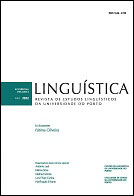Expression of genericity in Portuguese and Croatian proverbs
Abstract
Starting from the hypothesis that proverbs represent prototypes of generic sentences and considering that, in our view, they have not been properly studied in the field of linguistics (especially Croatian linguistics), we propose in this work to reflect on the mechanisms that convey the generic value of proverbs. We believe that the generic interpretation in a proverbial context arises from the interaction of several factors – from the linguistic (semantic-pragmatic) ones to certain conceptual mechanisms. At the linguistic level, genericity is actualized in the behavior of several grammatical categories, from nouns and noun phrases, adverbial adjuncts, determiners and quantifiers, and temporal, aspectual and modal values, to the interpropositional relations that represent “type-situations”. For the purposes of this work, we focused on the noun phrase (in the subject position), an aspect that we find relevant even in terms of comparing Portuguese and Croatian proverbial texts, due to the differences between these two languages in the expression of the category (in)determination. The problematization of the properties of the subject noun phrase necessarily requires considering the semantic nature of predications. Since genericity is a linguistic, but also a logical and conceptual “universal”, we propose to investigate the mechanisms in which it is actualized in (European) Portuguese and Croatian proverbs
References
Anscombre, J-C. (2010). Las formas sentenciosas: Un fenómeno lingüístico. Revista de Investigación Lingüística, 13, 17-43.
Bajrić, S. (2006). Article et/ou numéral. In O. Soutet (Ed.), Études de linguistique contrastive (pp. 99-111). Presses de l’Université Paris-Sorbonne.
Belaj, B., & Tanacković Faletar, G. (2014). Kognitivna gramatika hrvatskoga jezika. Knjiga prva: Imenska sintagma i sintaksa padeža. Disput.
Bikić-Carić, G. (2008). Član u francuskom i rumunjskom te njegovi hrvatski ekvivalenti u računalnom usporednom korpusu [Tese de Doutoramento]. Universidade de Zagreb.
Carlson, G. (1982). Generic terms and generic sentences. Journal of Philosophical Logic, 11(2), 145-181.
Chierchia, G. (1995). Individual-Level predicates as inherenh generics. In G. Carlson, & F. Pelletier (Eds.), The Generic Book (pp. 176-223). Chicago University Press.
Corpas Pastor, G. (1996). Manual de fraseología española. Gredos.
Cruse, A. D. (2006). A Glosssary of Semantics and Pragmatics. Edinburgh University Press.
Hurford, J., Heasley B., & Smith, M. (2007). Semantics: a coursebook. Cambridge University Press.
Kleiber, G. (1989). Sur la définition du proverbe. Recherches Germaniques, 2, 232-252.
Krifka, M., Pelletier, F., Carlson, , G., Meulen, A., Link, G., & Chierchia, G. (1995). Genericity: an introduction. In G. Carlson, & F. Pelletier (Eds.), The Generic Book (pp. 1-124). Chicago University Press.
Kukić, T. N. (2018). Semantičko-pragmatička analiza italijanskog člana i njegovi ekvivalenti u srpskom jeziku iz perspektive referencijalnosti [Tese de Doutoramento]. Universidade de Belgrado.
Lakoff, G., & Turner, M. (1989). More than cool reason: a Field Guide to Poetic Metaphor. The University of Chicago Press.
Langacker, R. W. (1991). Foundations of Cognitve Grammar (Vol. 2). Stanford University Press.
Lopes, A. C. M. (1992). Texto proverbial português: elementos para uma análise semântica e pragmática [Tese de Doutoramento]. Universidade de Coimbra.
Lopes, A. C. M., & Santos, P. (1993). A condicionalidade das frases genéricas. Cadernos de Semântica, 17, 1-28.
Lyons, C. (1977). Semantics. Cambridge University Press.
Marković, I. (2002). Nešto o neodređenosti/određenosti u hrvatskome. Rasprave Zavoda za hrvatski jezik, 28(1), 103-150.
Marković, I. (2010). O uporabi i značenju imenâ u hrvatskome. Folia Onomastica Croatica, (19), 175-202.
Miguel, M., & Raposo, E. B. P. (2013). Determinantes. In E. B. P. Raposo, M. F. B. do Nascimento, M. A. C. da Mota, L. Segura, & A. Mendes (Eds.), Gramática do Português(Vol. 1, pp. 819-882). Fundação Calouste Gulbenkian.
Oliveira, F., & Silva, F. (2007). Indefinites and bare nouns in generic contexts in European Portuguese. Verbum, XXIX, 225-241.
Peres, J. A. (2013). Semântica do sintagma nominal. In E. B. P. Raposo, M. F. B. do Nascimento, M. A. C. da Mota, L. Segura, & A. Mendes (Eds.), Gramática do Português(Vol. 1, pp. 735-828). Fundação Calouste Gulbenkian.
Pivčević, M. (2019). Analiza i uporaba člana u francuskome i hrvatskome jeziku [Tese de Doutoramento]. Universidade de Zadar.
Pranjković, I. (2000). Izražavanje neodređenosti/određenosti u hrvatskome jeziku. In A. Car-Mihec, M. Kovačević, I. Lukežić, I. Srdoč-Konestra, M. Stojević, & D. Stolac (Eds.), Riječki filološki dani. Zbornik radova 3 (pp. 343-350). Faculdade de Filosofia da Universidade de Rijeka.
Raposo, E. B. P., & do Nascimento, M. F. B. (2013). Nomes próprios. In E. B. P. Raposo, M. F. B. Do Nascimento, M. A. C. Da Mota, L. Segura, & A. Mendes (Eds.), Gramática do Português (Vol. 1, pp. 993-1044). Fundação Calouste Gulbenkian.
Schubert, L. K., & Pelletier, F. (1988). An Outlook on Generic Statements. In Krifka, M. (Ed.), Genericity in Natural Language (pp. 357-372). Tübingen: Seminar fur naturlich-sprachliche systeme der Universität Tübingen.
Silić, J. (2000). Kategorija neodređenosti/određenosti i načini njezina izražavanja. In A. Car-Mihec, M. Kovačević, I. Lukežić, I. Srdoč-Konestra, M. Stojević, & D. Stolac (Eds.), Riječki filološki dani. Zbornik radova 3 (pp. 401-405). Faculdade de Filosofia da Universidade de Rijeka.
Sullivan, K., & Sweetser, E. (2010). Is “Generic is Specific“ a Metaphor? In F. Parril, V.
Tobin, & M. Turner (Eds.), Meaning, Form & Body (pp. 309-328). CSLI Publications.Šarić, Lj. (2002). Kvantifikacija u hrvatskome jeziku. Institut za hrvatski jezik i jezikoslovlje.Znika, M. (2006). Kategorija određenosti i predikatno ime. Jezik, 53(1), 16-25.
Downloads
Published
Issue
Section
License
Copyright (c) 2022 Linguística: Revista de Estudos Linguísticos da Universidade do Porto

This work is licensed under a Creative Commons Attribution-NonCommercial 4.0 International License.



